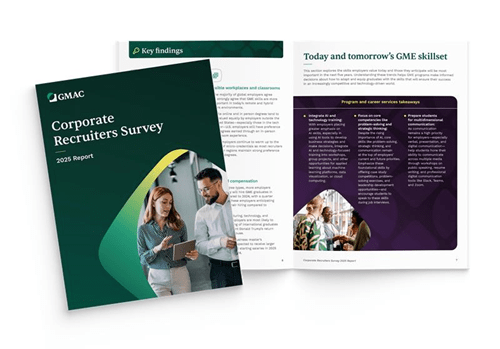About the Corporate Recruiters Survey
For more than two decades, the Corporate Recruiters Survey from the Graduate Management Admission Council™ (GMAC™) has provided the world’s graduate business schools and employers with data and insights to understand current trends in skill demand, hiring, compensation, and perceptions of MBA and business master’s graduates.
Based on responses from over 1,100 corporate recruiters and hiring managers at staffing firms around the world, the Corporate Recruiters Survey results provide updates around these core themes. In addition, it explores which skills employers think will characterize the future workplace—including the role of artificial intelligence—and how employers value business school amid challenging macroeconomic conditions across industries and around the globe.
Read the full report
Three Things You Need to Know About the Corporate Recruiters Survey 2025
2025 Report and Resources

2025 Regional Profiles
Industry Perspectives
“As flexibility in work and learning becomes a norm, business school graduates—with degrees or credentials earned in-person or remotely—should feel empowered that their employability continues to outperform those without an advanced management degree, especially when they understand and underscore how they are skilled in strategic thinking, problem-solving, and communications alongside technological savvy.” - Christine Murray, associate dean & managing director of McDonough Career Center at Georgetown University’s McDonough School of Business.
“As AI becomes more integral in a company’s decision-making and strategy development, employers continue to turn to business school graduates for their versatility and strategic thinking, along with growing appreciation for their ability to innovate and navigate the challenges and opportunities of technological disruption. I give kudos to business schools’ intentional cultivation of these relevant skills in their students, who stand out even more as valuable contributors and future leaders in the ever-evolving business world.” - Joy Jones, CEO of GMAC.
Past Reports
2024 | 2023 | 2022 | 2021 | 2020 | 2019 | 2018 | 2017 | 2016 | 2015 | 2014
For more past reports, explore our Research Library.